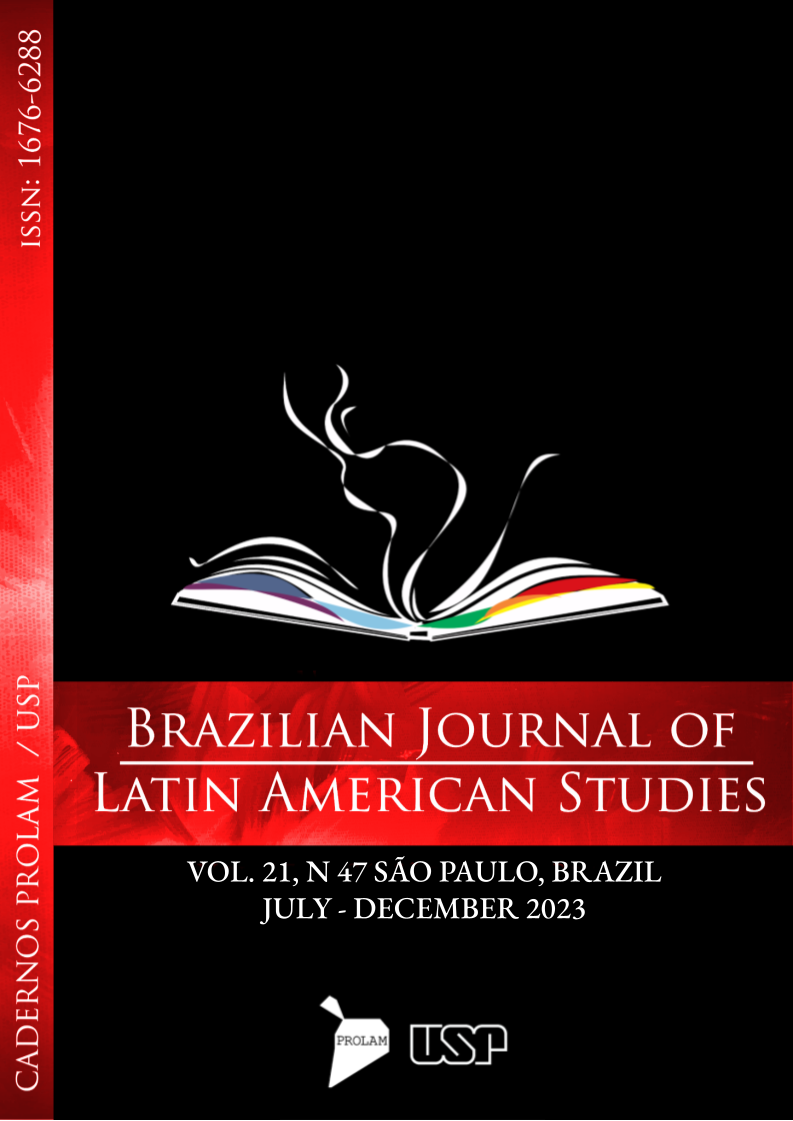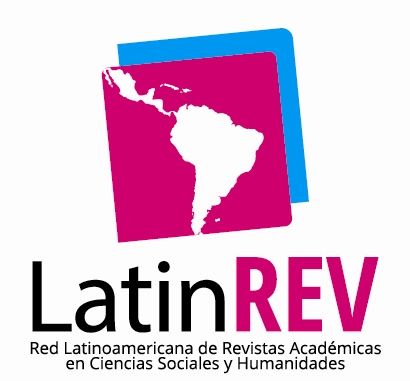Yolanda Valentino: reiterando e criticando os estereótipos latinos através da performance drag
DOI:
https://doi.org/10.11606/issn.1676-6288.prolam.23.212349Palavras-chave:
Migração, Mercado de trabalho, Estereótipos, Multiculturalismo, NeoliberalismoResumo
Este artigo se dedica às ações de Yolanda Valentino, uma mulher brasileira, que se identificava como branca antes de migrar e como racializada depois da migração. Em Ottawa, Ontário, Canadá, Yolanda também se identificou como drag queen, em um local específico, o Hot Room, uma boate queer aberta para a diversidade sexual e de gênero no Canadá. Destaco a atuação de Yolanda, pois de um modo ou de outro, nela se localizam as situações mais importantes que as latinas, como mulheres da América Latina que compartilham experiências raciais comuns, vivenciam na cidade. Além disso, meu interesse consiste em exaltar os estereótipos das latinas como elemento de grande importância nos estudos latino-americanos. Concentro-me no espectáculo de Yolanda baseado em estereótipos - como a ideia de que latinas só servem para trabalhos domésticos -, com o propósito de analisar como estes são adotados, mesmo que de forma contraditória, na vida noturna de Ottawa, cidade considerada multicultural. Também defendo que a política de multiculturalismo ajudou a perpetuar tais estereótipos em Ottawa, o que, por sua vez, teve implicações para as latinas, incluindo as latinas com diversidade sexual e de gênero. Ao mesmo tempo, utilizo a teoria da fronteira de Gloria Anzaldúa (2012) para analisar a atuação drag de Yolanda como uma performance capaz de desafiar as normas sociais predominantes em Ottawa ligadas a gênero, raça, classe, social e sexualidade. Tal atuação, simultaneamente, é capaz de questionar políticas específicas como a de multiculturalismo e o status quo da cidade.
Downloads
Referências
ANDREW, Carolie (Ed.). Studies in political economy: Developments in feminism. Toronto, ON: Women’s Press Toronto, 117-124, 2003. ISBN: 0889614121
ANZALDÚA, Gloria. Borderlands la frontera: The new mestiza. San Francisco, CA: Aunt Lute Books, 2012. Available in https://enriquedussel.com/txt/Textos_200_Obras/Giro_descolonizador/Frontera-Gloria_Anzaldua.pdf
Access at: Oct. 24, 2023.
ARAT-KOC, Sedef. In the privacy of our own home: Foreign domestic workers as solution to the crisis in the domestic sphere in Canada. Studies in Political Economy, v. 28, n. 1, p. 33-58, 2016 [1989]. https://doi.org/10.1080/19187033.1989.11675524.
BAUDER, Harald. Cultural representations of immigrant workers by service providers and employers. Journal of International Migration and Integration, v. 4, n. 3, p. 415–438, 2003. https://doi.org/10.1007/s12134-003-1028-9.
BESERRA, Bernadete. Under the shadow of Carmen Miranda and carnival: Brazilian Women in Los Angeles. Cadernos PAGU, v. 28, p. 313-344, 2008. https://doi.org/10.1590/S0104-83332007000100014
BOURDIEU, Pierre. The Economics of Linguistic Exchanges. Social Science Information. v. 16, n. 6, p. 645-668, 1977. https://doi.org/10.1177/053901847701600
BUECHLER, Simone. The global financial crisis and the retrenchment of multiculturalism and economic opportunities for Brazilian immigrants in Newark, New Jersey. Latino Studies, v. 14, n. 4, p. 596-608, 2014. https://doi.org/10.1057/lst.2014.57
COE, Cati. The New American Servitude: Political Belonging Among African Immigrant Home Care Workers. New York, NY: New York University Press, 2019. Available in: https://muse.jhu.edu/pub/193/monograph/book/76058. Access at: Oct. 24, 2023.
FOUCAULT, Michel. Power/knowledge 1972-1977: Selected interviews & other writings. New York, NY: Pantheon Books, 1980. Available in: https://monoskop.org/images/5/5d/Foucault_Michel_Power_Knowledge_Selected_Interviews_and_Other_Writings_1972-1977.pdf Access at: Oct. 24, 2023.
GOLDBERG, David Theo. Multiculturalism: A critical reader. Cambridge, MA: Blackwell Publishers Inc, 1994. ISBN: 978-0-631-18912-1
MOTT MACHADO, Michel et al.. The Canadian experience from the perspective of Brazilian immigrant entrepreneurship in Toronto. Iberoamerican Journal of Entrepreneurship and Small Business, v. 10, n. 3, p. 1-17, 2020. https://doi.org/10.14211/regepe.e1963
MARGOLIS, Rachel et al. Capturing trends in Canadian divorce in an era without vital statistics. Demographic Research, v. 41, n. 52, 2019. doi:10.4054/DemRes.2016.35.50
MOREMAN, Shane T.; MCINTOSH, Dawn Marie. Brown scriptings and rescriptings: A critical performance ethnography of Latina drag queens. Communication and Critical/Cultural Studies, v. 7, n. 2, p. 115-135, 2010. https://doi.org/10.1080/14791421003767912
MUÑOZ, José Esteban. Disidentifications: Queers of color and the performance of politics. Minneapolis and London, MN/LDN: University of Minnesota Press, 1999. ISBN: 0816630143
RAMOS-ZAYAS, Ana. Becoming Brazuca: Brazilian Immigration to the United States. Cambridge, MA: Harvard University David Rockefeller Center for Latin American Studies, 2008. ISBN : 9780674028029
SKUTNABB-KANGAS, Tove; CUMMINS, James. (Eds). Minority education: From shame to struggle. Clevedon, PHILA: Multilingual Matters, 1988. Available in: https://unesdoc.unesco.org/ark:/48223/pf0000216624 . Access at: Oct. 24, 2023.
STATSCAN 150 years of immigration in Canada. Population fluctuations, June 29, 2016. Available in: https://www150.statcan.gc.ca/n1/pub/11-630-x/11-630-x2016006-eng.htm. Access at: Jan. 31, 2023.
TOMIC, Patricia. The colour of language: Accent, devaluation and resistance in Latin American immigrant lives in Canada. Journal of Canadian Ethnic Studies, v. 45, n. 1, 2, p. 1-21, 2013. https://doi.org/10.1353/ces.2013.0018.
WELLS, Paul. Social conservatism on the rise in Ottawa? Ottawa, May 4, 2010. Available in: https://www.thecanadianencyclopedia.ca/en/article/social-conservatism-on-the-rise-in-ottawa. Access at: Feb. 10, 2023.
WILSON-FORSBERG, Stacey. We don’t integrate; we adapt: Latin American immigrants interpret their Canadian employment experiences in Southwestern Ontario. Journal of International Migration and Integration, v. 16, p. 469–489, 2014. DOI: https://doi.org/10.1007/s12134-014-0349-1.
Downloads
Publicado
Edição
Seção
Licença
Copyright (c) 2023 Liz Veronica Vicencio Diaz

Este trabalho está licenciado sob uma licença Creative Commons Attribution-NonCommercial 4.0 International License.
A BJLAS adota a política de Acesso Livre (Libre Open Access), sob o acordo padrão Creative Commons (CC BY-NC 4.0). O acordo prevê que:
- A submissão de texto autoriza sua publicação e implica compromisso de que o mesmo material não esteja sendo submetido a outro periódico. O original é considerado definitivo;
- Autores mantêm os direitos autorais e concedem à revista o direito de primeira publicação, com o trabalho simultaneamente licenciado sob a Licença Creative Commons Attribution (CC BY-NC 4.0).
- Autores têm autorização para assumir contratos adicionais separadamente, para distribuição não-exclusiva da versão do trabalho publicada nesta revista (ex.: publicar em repositório institucional ou como capítulo de livro), com necessário reconhecimento de autoria e publicação inicial nesta revista;
- Autores têm permissão e são estimulados a publicar e distribuir seu trabalho online (ex.: em repositórios institucionais, repositórios específicos, ou na sua página pessoal) após o processo editorial, já que isso pode gerar alterações produtivas, bem como aumentar o impacto e a citação do trabalho publicado (Veja O Efeito do Acesso Livre).
- O detentor dos direitos autorais da revista, exceto os já acordados no acordo sob a Licença Creative Commons Attribution (CC BY-NC 4.0), é o Programa de Pós-graduação Integração da América Latina.
É permitida a cópia, reprodução e distribuição de textos, imagens, dados e demais arquivos, no todo ou em parte, em qualquer formato ou meio, desde que sejam observadas as regras da licença Creative Commons (CC BY-NC 4.0):
- O uso do material copiado e ou reproduzido no todo ou em partes deve se destinar apenas a fins educacionais, de pesquisa, uso pessoal ou outros usos não comerciais. Reproduções para fins comerciais são proibidas;
- O material pode ser copiado e redistribuído em qualquer suporte ou formato;
- A reprodução deverá ser acompanhada da citação da fonte na integra incluindo o(s) nome(s) do(s) aturoes(s), no seguinte formato: Fonte: Revista Cadernos Prolam/USP. Brazilian Journal of Latin American Studies;
- Os nomes e endereços informados na revista serão usados exclusivamente para os serviços prestados por esta publicação, não sendo disponibilizados para outras finalidades ou a terceiros.












